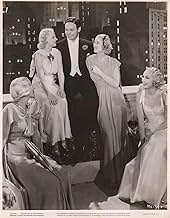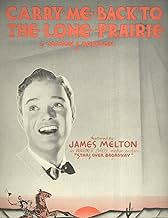Adicionar um enredo no seu idiomaAl is a down-on-his-luck promoter who is thinking of taking the final bow when he meets singing porter Jan. He sees something in Jan so he signs him to a contract. Al works odd jobs to pay f... Ler tudoAl is a down-on-his-luck promoter who is thinking of taking the final bow when he meets singing porter Jan. He sees something in Jan so he signs him to a contract. Al works odd jobs to pay for Jan's singing lessons and drops the idea of Opera when he learns that it will take year... Ler tudoAl is a down-on-his-luck promoter who is thinking of taking the final bow when he meets singing porter Jan. He sees something in Jan so he signs him to a contract. Al works odd jobs to pay for Jan's singing lessons and drops the idea of Opera when he learns that it will take years. He has him sing in a nightclub and from there it is up. But Jan soon starts missing les... Ler tudo
- Direção
- Roteiristas
- Artistas
- John - 'At Your Service, Madame' Number
- (não creditado)
- Mustached Man at Champ's Table
- (não creditado)
- Man Wanting Testimonial
- (não creditado)
- Jim Flugel
- (não creditado)
- Man in Church
- (não creditado)
- Charlie
- (não creditado)
- Listener in Italy Montage
- (não creditado)
- Man
- (não creditado)
Avaliações em destaque
The story starts out in a bar with down-on-his-luck agent/talent scout Al McGillevray (Pat O'Brien) being the butt of jokes at every table he visits in the joint. Disheartened, he goes back to his hotel and requests his trunk be brought up to his room, saying he's going to check out. He is - but not the way the night clerk thinks as Al has a gun in that trunk and plans to end it all. He changes his mind when happy singing porter Jan King (James Melton) arrives with his trunk and Al thinks he can make him into a sensation and finally become a big shot which seems to be his highest goal in life.
Al takes odd jobs in order to pay Jan's expenses during the weeks it takes for Jan to take some basic voice training from Professor Minotti, and then Jan makes his debut. Minotti wants to take Jan to Italy for lengthy training so that he can sing opera, since he has that potential. This doesn't mix with anxious Al's desire to drag Jan to the top as fast as possible so he can go around town crowing that he discovered him. What is dragged up fast can be dragged down in a hurry too, as Jan begins to be more interested in wine and women than song. Throughout all of this, there is the presence of a demure young woman, Nora, who wants to be a singer. She is constantly asking Al if he'll be her agent, and for some reason that's not clearly understandable, he keeps refusing. Things come to a head between Jan and Al when Jan not only is trashing his own career but is planning on making Nora another notch in his belt.
This one is a little light on dramatic enjoyment but I have to take my hat off to Pat O'Brien's acting here. His character starts out a weakling who is willing to end it all over nothing more than foolish pride, but by the end of the film I really admired the guy. On top of that there's some beautiful singing by James Melton in one of his very few film appearances of the 30's.
He handles his singing chores with professional ease but there's not much to be said about his bland acting. It's another story about the discovery of a new singing star while his manager makes personal sacrifices for the sake of new talent. FRANK McHUGH and MARIE Wilson offer some comedy support (not enough), and JEAN MUIR is colorless in a minor role as an aspiring singer who catches O'Brien's eye.
Melton's quick rise to stardom is too much for him and he has to be straightened out by manager O'Brien and friends when his drinking gets out of hand. The story limps toward a dramatic conclusion, but it's no use. None of it is the least bit convincing and the only lasting impression is made by JANE FROMAN, graceful and charming in a brief role.
Melton would return to the Metropolitan Opera and concert engagements, making another rare appearance in MGM's Technicolored ZIEGFELD FOLLIES OF 1946, singing an aria from "La Traviata" and continuing success on the stage of opera houses and occasional TV appearances on shows like "The Bell Telephone Hour"--but the movies never turned out to be his medium and he never made the sort of impression in operatic roles that other operatic singers did (like NELSON EDDY or MARIO LANZA).
Columbia made a successful opera star film, now everybody got into the act. Twentieth Century Fox signed Lily Pons, Paramount inked Gladys Swarthout, MGM had Lawrence Tibbett for awhile. Nelson Eddy made the only real transition from grand opera to Hollywood.
Anyway Warner Brothers signed Metropolitan Opera tenor James Melton and I have to say he had a very pleasant voice and a personality that was easy to take. He's a bellhop who's voice comes over into Pat O'Brien's room as down on his luck theatrical agent O'Brien is contemplating suicide. Not an uncommon thing in the Depression as people became paupers overnight at times.
The rest of the film is the trials and tribulations Melton and O'Brien go through. The song Melton sang, Carry Me Back to the Lone Prarie, a cowboy ballad became a staple item during his concerts.
Another interesting piece of trivia is that the song September in the Rain was cut from the finished film. You can hear it played in the background. It was sung in another film by James Melton called Melody for Two and became a popular hit for him.
Jane Froman is also in the film and it's interesting why she never became a film star, except really in her own autobiographical film, With a Song In My Heart where she sings with Susan Hayward lipsynching. She had the looks and the voice. Who can tell about these things.
I recommend this film highly so people can get to hear what a couple of real good singers are like from the thirties. Especially Melton. I happen to have a few recordings of him and he has an infectious lilt in his voice. The only film that's really available for people to see him in is The Ziegfeld Follies where he and Marion Bell sing an aria from La Traviata. It was a good number, but Melton did so much more than that.
Froman was an attractive singer with a distinct, wonderful voice who entertained on stage, radio and the nightclub circuit in the 1930s through 1950s. She sang in the Ziegfeld Follies and had her own TV show on CBS. She was one of the earliest entertainers to sign on for the USO program to entertain GIs during WW II. But on her February 1943 plane flight to Europe, she was seriously injured when the plane crashed in the river bay before landing in Lisbon. Froman spent a long time in recovery, and had many operations during her lifetime for injuries to both legs and one arm.
After recovering in a Spanish hospital, she returned to the States for many more months of recovery. She was able to sing again, but had to sit in a wheelchair or be supported standing. She then flew back to Europe to entertain the troops during the last year of the war. After that she sang a few more years in the States and then settled down in her hometown of Columbia, Missouri. She has three stars on the Hollywood Walk of Fame for radio, recording and television.
It's too bad Froman didn't appear in any of the many musicals that were being made in the late 1940s and early 1950s. Her voice was distinctly remarkable and she had a very good stage persona. Those who enjoy her singing and would like to hear more might watch the biopic musical that was made about her life. It's an interesting and entertaining film, and Froman sings all the numbers that are then dubbed for Susan Hayward who plays her part. The film is "With a Song in My Heart" of 1952, by 20th Century Fox.
Você sabia?
- CuriosidadesMarie Wilson's first credited screen role.
- Trilhas sonorasAt Your Service, Madame
(1935) (uncredited)
Music by Harry Warren
Lyrics by Al Dubin
Played during the opening credits
Also played when Freddy is introduced to Al and Jan at Witmark's
Performed by James Melton, Jane Froman and chorus
Principais escolhas
Detalhes
- Data de lançamento
- País de origem
- Idiomas
- Também conhecido como
- Stars Over Broadway
- Locações de filme
- Empresa de produção
- Consulte mais créditos da empresa na IMDbPro
- Tempo de duração
- 1 h 29 min(89 min)
- Cor
- Mixagem de som
- Proporção
- 1.37 : 1





































